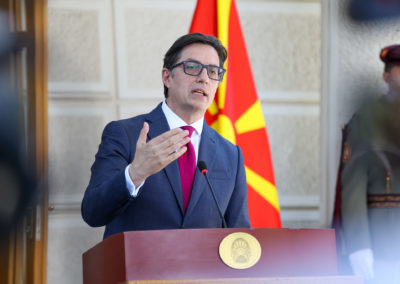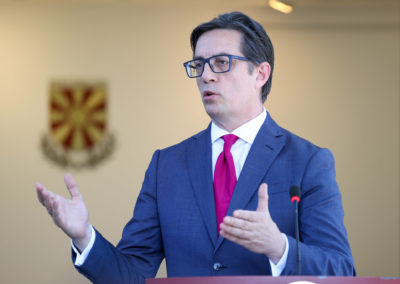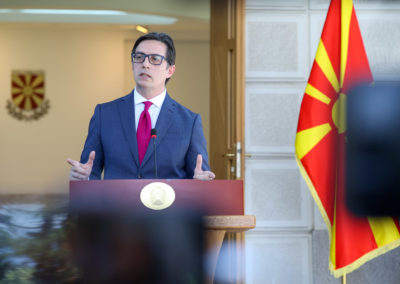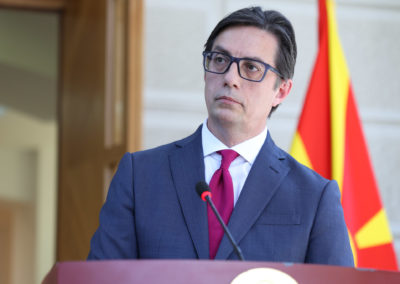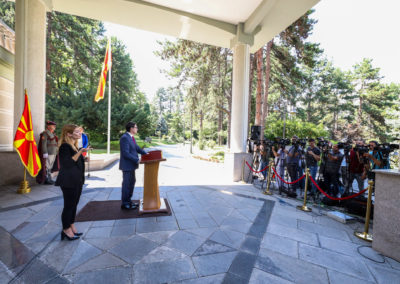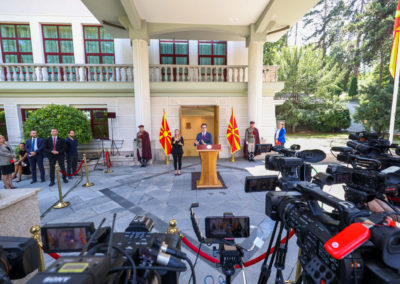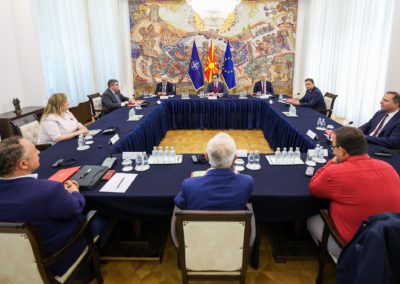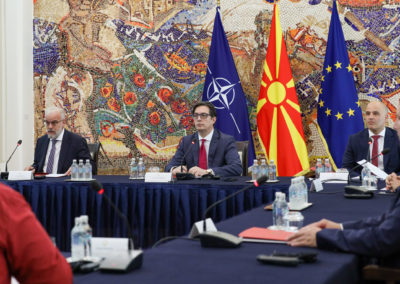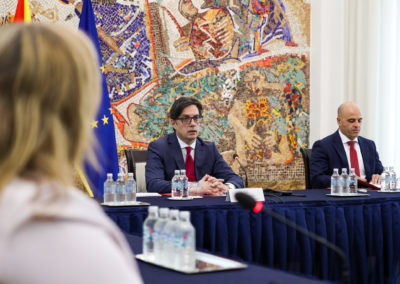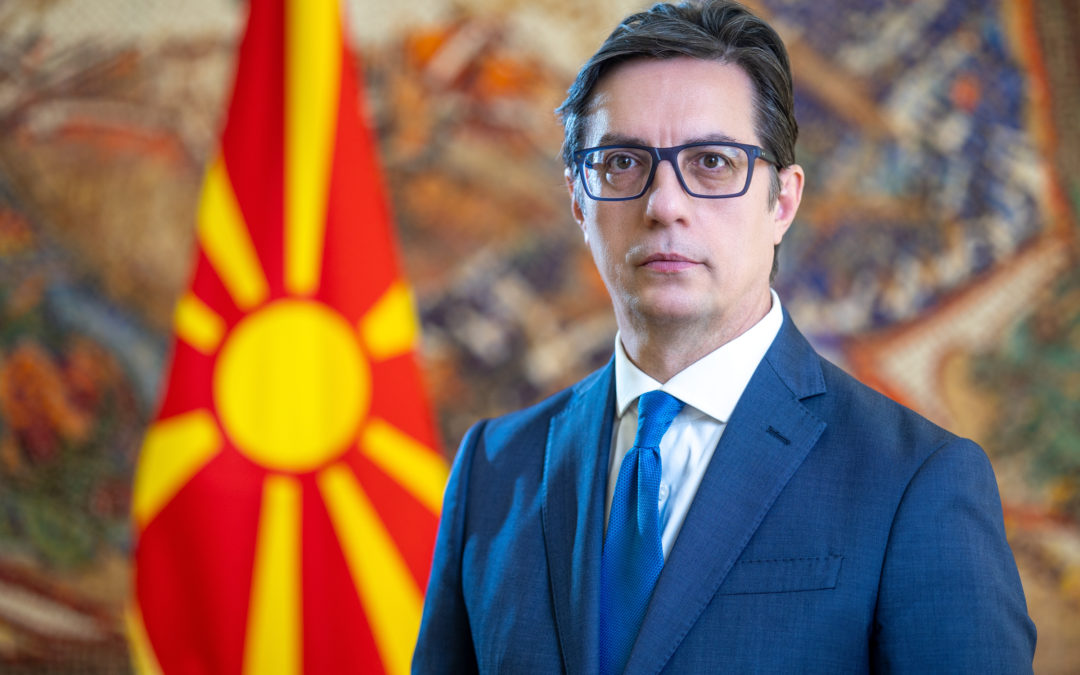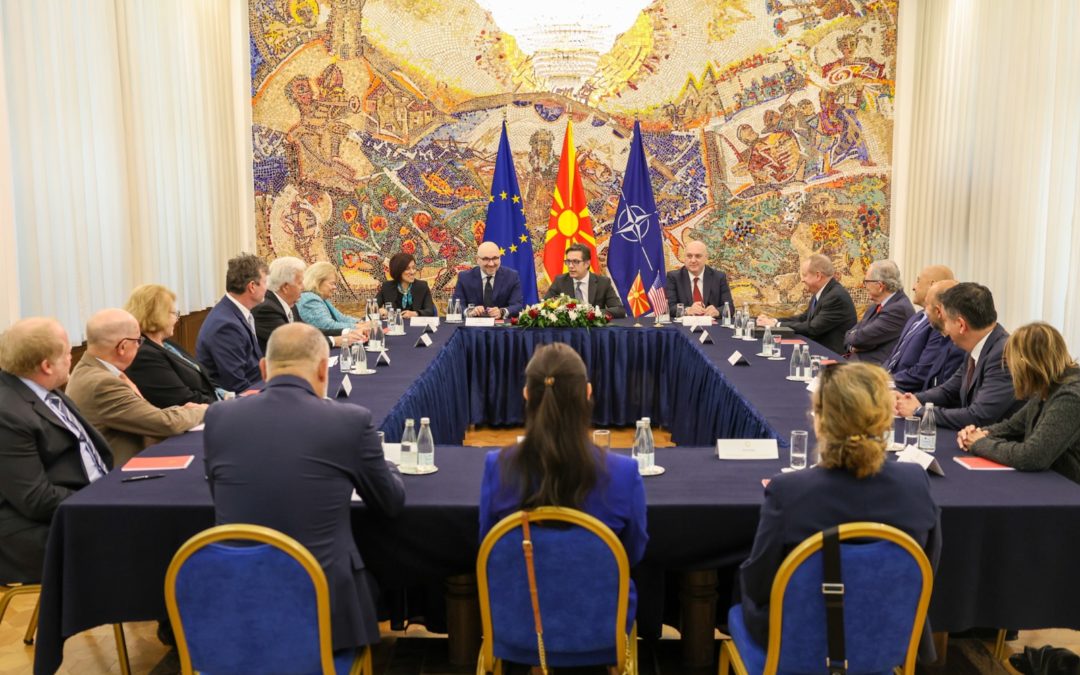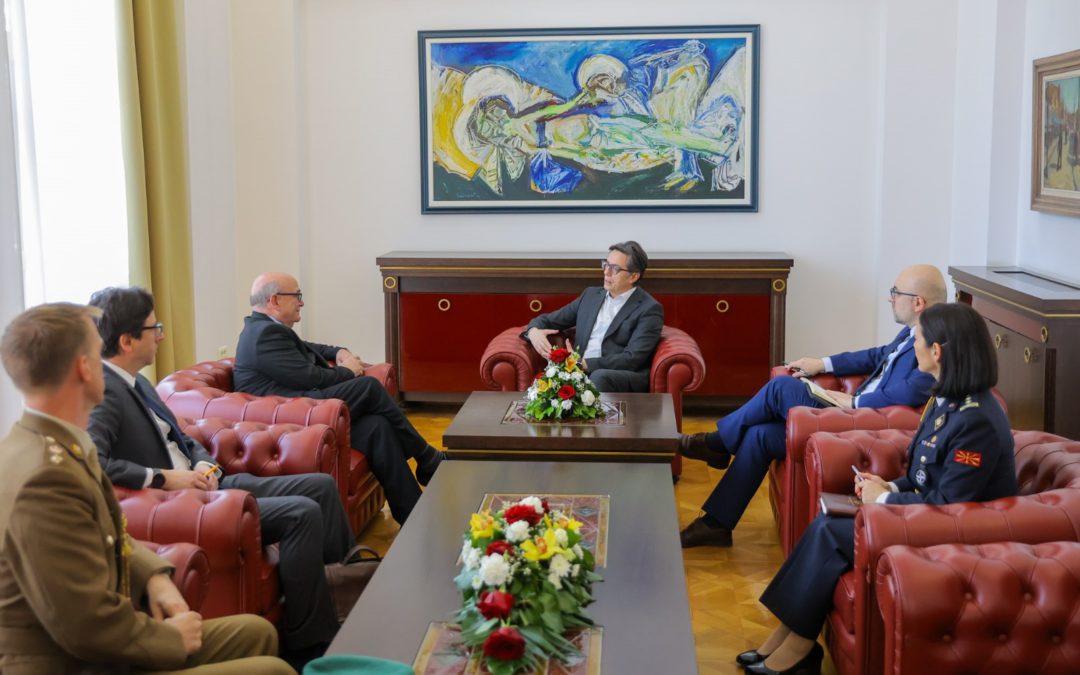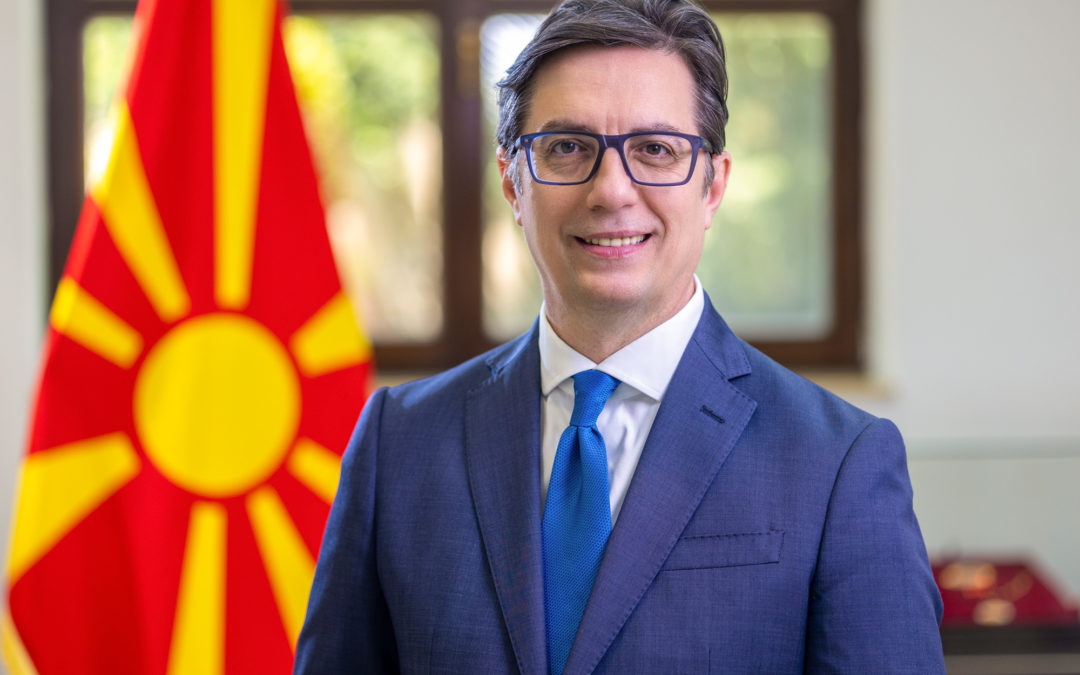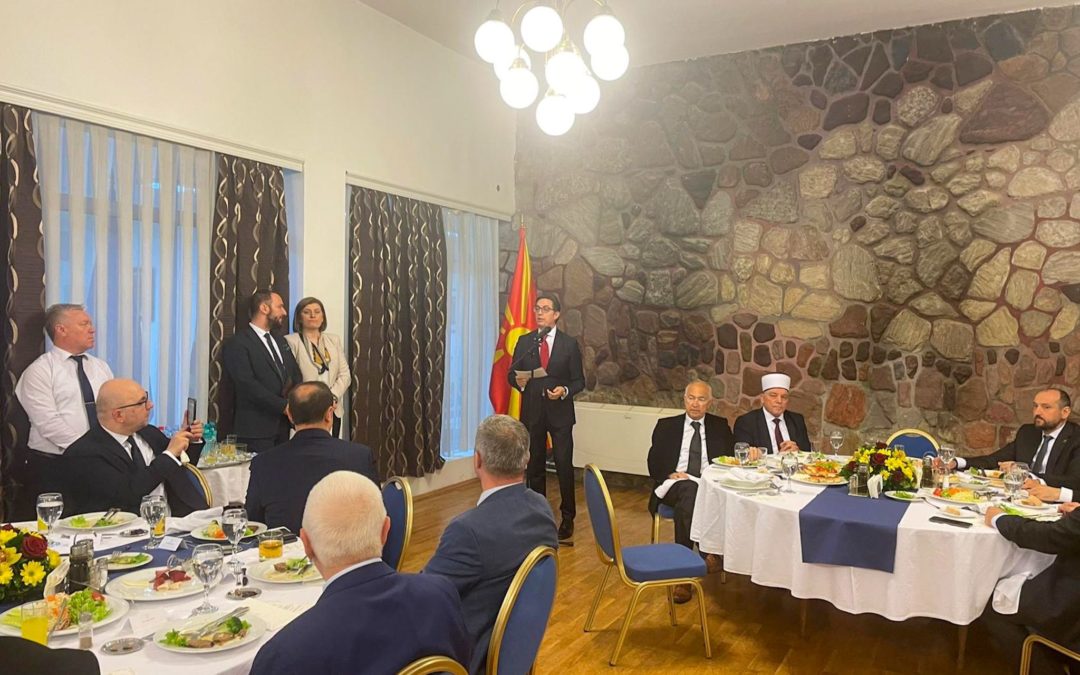Today, the 16th session of the Security Council was held in the President’s Cabinet, having on the agenda the modified proposal of the French presidency with the EU for the start of the accession negotiations of the Republic of North Macedonia with the European Union.
After the end of the session, which was attended by the members of the Security Council and the Deputy Prime Minister for European Affairs, Bojan Maricic, President Stevo Pendarovski made a statement.
Below is the full text of President Pendarovski’s statement.
Ladies and gentlemen,
The 16th session of the Security Council was held today. The Council seated in full composition; all regular members of the Council and Mr. Maricic, Vice Prime Minister for European integrations, also attended the session at my invitation, because of the topic that was on the agenda. Maybe someone will ask why a Security Council session on this topic? You know that in the past few years, the Council discussed topics out of the group of traditional ones, let me call them security and defense issues or threats. For example, we discussed air pollution 2 years ago, we discussed the pandemic on several occasions, measures against the pandemic. It is logical, in my opinion, to discuss the latest French proposal to overcome the Bulgarian blockade, because it is a strategic issue for the country.
You know the positions of the members of the Security Council, by function, about the document, or you will find out today or tomorrow in relation to possible conclusions and public communication of those conclusions by the Government, and the three members of the Council who are not politicians analyzed the text only from their point of view and offered their expert opinion.
I think it is best to concentrate on what I think based on the discussion and what I see, what I have been participating in for the past months. I will not speak of the initial Bulgarian proposals of two years ago, which did not receive support from any of our allies or partners within the European Union in Brussels, of those nebulous demands: language, nation, occupation, administration, etc., that today they are essentially reduced to their main request, which is inclusion of the Bulgarian community in our Constitution.
At the beginning, in one sentence, I would like to try to describe the whole situation of extremely high political tensions in the country: I do not believe that the perception that is created in part of the public that this is a fateful dilemma to be or not for the nation and for the state is correct and that supposedly these days we have to make a decision that will define the destiny of future generations of Macedonians and Macedonian citizens.
My view is that by deciding to accept the modified French proposal, we would only be making a decision to open negotiations, and you know that they have been going on for years. The time of short negotiations ended in the last century when it was possible to synchronize, as they call it, the national legislation with the EU acquis in a year or two. So far, Serbia has been negotiating for 9 years, Montenegro for 10, only as the last illustrations of the region.
The decision to accept the modified French proposal will be neither a historic triumph, as one camp would call it, nor a historic failure or debacle, as those in the other camp say.
In my opinion, it is a question of a transitional compromise for one of the phases of European integration, in which 3 elements are important, and therefore the proposal, in my opinion, in this format, is acceptable at this stage.
First, with the proposal, we lift the Bulgarian blockade that has lasted for more than two years and the proposal allows formal opening of negotiations after 17 years of waiting. Second, it enables a screening process that is a mandatory stage before the negotiations on the clusters, formerly the chapters, and thirdly, what is absolutely most important, not only for me, for each of us, but it does not undermine the Macedonian identity in any way, because for the key, fundamental determinant of that identity – the Macedonian language, there is a clean formulation in the proposal, without footnotes.
Why do I call it a transitional compromise? Because it solves the current problem, the current blockade, but it contains a de facto new blockade, which this time can be and most likely will be our own, domestic one. Knowing the internal political constellation, the necessary threshold for constitutional changes of two-thirds seems completely unattainable at this moment. This condition also contains the biggest paradox of the proposal – namely, nobody, in principle, here at home, is against the entry of Bulgarians into the Constitution, but internal polarization makes consensus on that issue impossible.
This condition, in my opinion, is the biggest weakness of the proposal, even though the constitutional amendments will be on the agenda after the screening, or according to some expert estimates, at the beginning of 2024.
You can ask if maybe we could have achieved more in this part. To be honest, I am convinced that we could not. A state with 1.8 million inhabitants and an average salary of 500 EUR, that is what it can do from the position of a candidate for membership. I do not claim that in the negotiations for the whole time in the past 2 years something of higher quality could be achieved in certain aspects, but these would possibly be details, not the essence for sure.
I want to comment on several theses related to this French proposal that has been the most debated these days.
First, why does it contain the bilateral agreement with Bulgaria? – Here is why: first, good neighborly relations have been part of the Copenhagen criteria since 1993, that is, almost three decades ago.
Secondly, the Prespa Agreement is also in the French framework, the implementation of which in certain segments, you know, has not been completed because they depend on the start and end of negotiations on certain clusters – there are so-called political and technical deadlines that only begin to run from then, from when the negotiations on the corresponding chapter, i.e. cluster start.
Third, let us not forget that the Framework Agreement was the main condition for us to obtain candidate status in 2005, which is domestic, but at the same time with international guarantees and an international agreement. And what we have forgotten, the elders remember – since 1997, for the first time, the EU introduces, as one of the conditions for the new members, the so-called regional clause, which translates to: without good relations with your neighbors you cannot claim to enter the EU – that is why it contains the bilateral agreement.
The second thesis is that the Bulgarians will be hindering us with this proposal, when they want and how they want. I will not repeat the thesis, you know it: so far the Bulgarians hindered us as they wanted even without a proposal, as they wanted and when they wanted. Such a possibility, of course, still exists because it is built into the mechanisms by which everyone, every country enters the EU, but I deem that those mechanisms will now, after we start negotiating, be drastically reduced as a possibility, as a variant because after this proposal becomes a European framework, the possibility of the so-called frequent or pure national blockades by anyone, including Sofia would be reduced. Namely, the evaluation of our bilateral agreement with Bulgaria goes on two levels.
One is pure bilateral, once a year at least, meetings of the Governments and evaluation – joint assessment, meaning not unilateral, joint what has been done, what has not been done and secondly, the European Commission, according to the proposal, the European Commission in Brussels also makes an evaluation of what has been done and what still needs to be done. So, in other words, from today onwards if, of course, the Government and the Parliament further accept this proposal, not only Bulgaria will appreciate our progress so far, but also the European Commission. In short, I think we will agree: it is better to be evaluated by Brussels than by Sofia, or rather than by Sofia alone.
Thirdly, there was a thesis that history is, from today on, or from the day we accept this proposal through the institutions, a condition for further progress in the negotiations. That is not true. With the French proposal, which tomorrow will be Pan-European, if we also accept it, history is not a condition at all. There is only one sentence in both the proposal and the protocols that have been mentioned a lot, and few have read them to the end, which is that it is recommended that the historical commission should speed up its work and have between eight and twelve meetings a year, without being suggested by the political factors of what their work should be and in which direction it should move. So, a suggestion that historians from both sides should meet more often. In this part, I want to say that at today’s meeting of the Council, we talked with the government representatives, of course, with the Prime Minister, and I told them that I expect and that I will publicly announce that position, after the French proposal enters the Government in the coming days, I do not know their dynamics and agenda, I expect the Government’s conclusions, which in case they accept this proposal, would have to have one sentence plus, and this would have to be repeated in the Government’s report to the Parliament, that from the day we open the negotiations, until the day we finish the negotiations, after that it does not matter how many years, if there are possibly additional attempts from Bulgaria or from any side within the framework of those negotiations with Europe, to again mention or conspire to enter the discussions of the issues called Macedonian identity, Macedonian language, Macedonian history, that at that same moment we should not wait even an hour for someone else to block us, but we ourselves should withdraw from those negotiations.
The last, or one of the last, theses that I want to briefly comment on is that there is a fear among a significant part of Macedonians, that we can enter the European Union only as Bulgarians and in no other way.
Dear friends, I think we are all aware of how a Macedonian can become a Bulgarian. With your own will, with mine, with our will, if we feel that way and that is what many of our citizens do, taking Bulgarian passports. And the second option is through occupation, for a foreign power to come here, and tell you forcefully and under threat, you must claim that you are Bulgarians. You have been Macedonians until now, but from tomorrow you will be Bulgarians. It does not exist in the history of world diplomacy, and especially in the more modern one, in the past century or two, that with a bilateral or multilateral agreement, someone made overnight, an entire nation with a different ethnic identification. This proposal does not, nor can it, advocate that. No sane person would negotiate, if they had any such intentions, with any of the parties involved in making this French proposal, not only the Bulgarians.
The last thesis that I want to comment on is that there is a fear, rightly, among many Macedonians, that Europe has been playing a double game with us for years, that it is hypocritical, that it is twofaced, and that this especially applies to key countries in the European Union. From the position of a man who has had numerous meetings with the top European politicians, not only now in Madrid at the NATO Summit, but also before, I can assure you that in my talks with Scholz, Macron and Charles Michel, with every high European representative or representative of the most powerful European countries, I did not get the impression that they want to destroy the Macedonian nation and the Macedonian people. On the contrary, both President Macron and Chancellor Scholz expressed a desire to come and address our Parliament, Scholz even has the idea, of course at our invitation, to come to Skopje, in North Macedonia, as soon as possible, and to try, it is his wish, his intention, to revive the Berlin process, which is a bit forgotten, coming with a large business delegation from the German business chamber. Their interest, according to all my assessments and observations, is economic.
I do not see that it is their interest to change someone’s ethnic map, including ours – the Macedonian one. I simply doubt that the President of the French Republic, Macron, or Chancellor Scholz would come, would express a desire to come to Skopje, while trying to destroy the Macedonian people, to destroy the country, just to admit us to the EU in a couple of years from now, as Bulgarians. I think it is illusory, frivolous to discuss that topic at all, because I refuse to believe that the intentions of these two, or any other European senior politician, are such.
With this proposal, in my view, we stay on the European track which is long, quite long, but at this moment, until this moment we are not really losing anything. I am convinced that right now is the time to open, I would call it, that Strategic Dialogue between us, here, not only for those two-thirds of the Constitution, even more for something else, in my opinion, for a far more important issue, which also requires a cross-party consensus, identical to that of the early 1990s.
Namely, the support for the EU is dropping dramatically, mostly due to the constant conditions towards us and towards other Western Balkan countries. Biggest generator, objectively speaking, for this situation, for this problem, is Brussels. The enlargement has been stalled for the entire Western Balkan region. I am not saying, because it would not be true if I say so, that we have made all the necessary reforms, but enlargement in Brussels has been on the margins, at the bottom of their political agenda for years. If we are talking realistically, their last decision to grant candidate status to Ukraine and Moldova is a purely symbolic decision. We all know that a country that is under attack, that is in the middle of a war, cannot make, even if it wants, any reforms.
These days, we talk only, I repeat, only about opening that process. Serbia and Montenegro have been negotiating for almost 10 years, and the end of that process is not in sight for them, and in the meantime, Brussels is promoting a new organization, a new format of cooperation initially called the European Political Community, which they say is supposed to help us join the European Union sooner. I ask what is the guarantee that the European political community will not be a de facto alternative to the European Union. I repeat de facto, because publicly, certainly no one from Brussels, will define it that way.
Therefore, I insist that we start a serious local, national debate as soon as possible on what will be our position in relation to all these initiatives and issues, which could thoroughly rearrange the political architecture of the continent.
Thank you.


